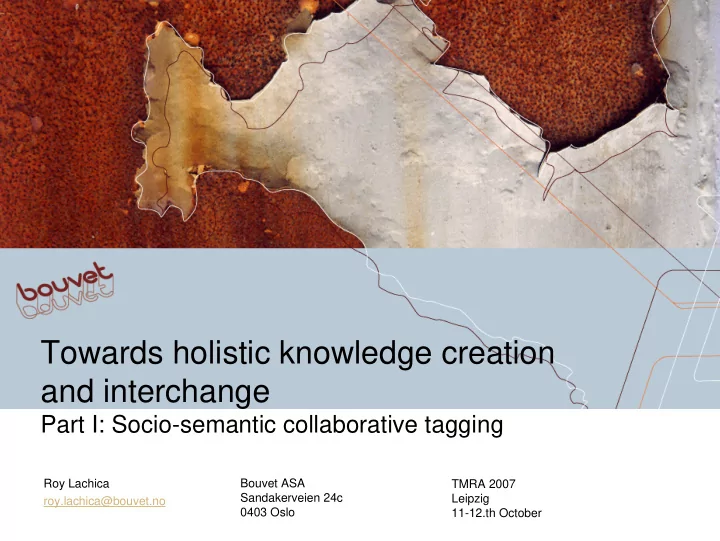

Towards holistic knowledge creation and interchange Part I: Socio-semantic collaborative tagging Roy Lachica Bouvet ASA TMRA 2007 Sandakerveien 24c Leipzig roy.lachica@bouvet.no 0403 Oslo 11-12.th October
Goal • The long term goal of the Information Design research group at the University of Oslo is to develop an open and democratic platform for the creation and sharing of holistic and polyscopic knowledge
Motivation • Information overload • Maximize the long-term common good by using information in new ways • A shift from reductionism to qualitative holism • Empower people to create meaning • Discover truths • Develop new ideas • Foreseeing consequences • Create consensus knowledge • Share knowledge • Spark scientific research
Key concepts • Knowledge creation and sharing • Discovery, mapping of reality • Enlightened democracy • Let everyone participate but recognize knowledge and wisdom • Polyscopy • Enable multiple views, both high level and low level information • Priority, key point, the essence • Holism • Discovering the whole truth • Seeing the whole, interrelations, transdiciplinary
Approach • Socio-semantic web • Users are paramount, let everyone participate • Folktology • Because the domain of discourse is evolving • Topic Maps • For semantic interoperability and its flexible and intuitive knowledge model
Introducing Fuzzzy.com Social bookmarking using a folktology (folk + ontology) Mix between folksonomy and ontology Ontology benefits: (top down) Folksonomy benefits: (bottom up) • Solves synonym and homonym problems • Wisdom of crowds • Solves morphological, syntactic and semantic Diverse opinions, independent decision-making, term variation decentralization of power, and a way of • Enable multi lingual support aggregating opinions. • More granularity • Low cost • More precise • Rapid adaptability to changing vocabularies • Oriented towards the common good through • Low barriers to cooperation design • Serendipitous browsing • Enables inferencing and reasoning • Reveals popularity (desire lines) • Explicit semantics enables machine processing and integration
Fuzzzy.com results • Knowledge creation and evolution works • Tags are more intuitive, meaningful, less ambiguous , search and retrieval is more precise • Very few users (~1%) are willing to create semantics • High cognitive load without immediate benefits • No need to externalise semantics • Low adoption of the system (~2%) • Other bookmarking services • Why collaborate. No shared purpose or sense of community • Complex GUI • Bookmarks are personal
Problems with large scale open collaborative Folktologies • Scopes • Info overload can not be solved with scopes • Fuzzzyness • Different world views -> Different terms/vocabularies, languages and contexts • User errors add noise • Relevance • Different views of what is important
Folktologies and relations between problems No specific shared purpose, goal or problem area No domain of discourse, no shared language (ontology) Irrelevance No scopes No community Noise Information overload Low user experience Low adoption Few benefits
How to tackle the problem Community netcentric application development Developing a knowledge creation infrastructure to be used in specific domains or problem areas. Accommodate a purpose and clearly stated goals within a specific domain of discourse. Either through: 1. A distributed network or 2. A single highly compartmentalized system • Low adoption and reluctance against Motivation, dedicated users, recognition creating metadata • Information overload Design, to the point instead of large pools • Scopes A defined domain • Relevance A defined problem • Fuzziness In tune, shared language, motivation for gardening work
Our proposal: Holoscopia • Holistic knowledge through distributed online communities • Different from Wikipedia: Wikipedia Holoscopia • “Compendium that contains • Tool for synthesis of new knowledge information on all branches • Contains problems and Of knowledge or a particular hypothesis for discovering Why branch of knowledge” wikipedia • Points to wikipedia and other • Contains facts: What, when, where, resources who, (how)
Envisioned system • Open distributed infrastructure with • Interconnected knowledge hubs argumentation decision support issue tracking concept mapping hypothesis testing discussion board wiki bookmarking
Folktologies and relations between problems No specific purpose, goal or problem area No domain of discourse, no shared language (ontology) Irrelevance No scopes No community Noise Information overload Low user experience Low adoption Few benefits
Knowledge creation in Holoscopia No specific purpose, goal or problem area No domain of discourse, no shared language (ontology) Leads to (association) Resulting situation No scopes Irrelevance (Topic Type) Problem (Topic Type) No community Noise Information overload Low user experience serendipitous browsing and discovery Low adoption - disproves Few benefits
Polyscopic knowledge base System components • User management and democracy (Elections, voting, propositions) • Intermediate knowledge creation layer (Consensus funnelling, organic ontology evolution) • Topic Map (Semantic interoperability)
Holism i Holoscopia System components • Discovery service / replication (Connectivity) • Fixed core ontology (Interoperability, peer fragment import, interscopic search) • Semantic proximity detection (Hub semantic distance) • Aggregation Web services (Insights, keypoint)
Conclusion • Creation of semantics require dedicated users and a domain of discourse which can be achieved by developing specialised knowledge creation tools and infrastructures for knowledge centric communities
Questions?
Thank you for your attention • roy.lachica@bouvet.no • www.fuzzzy.com
Recommend
More recommend